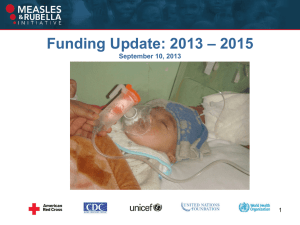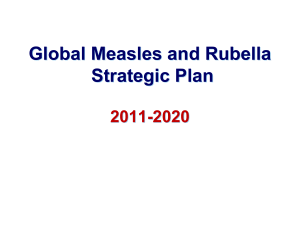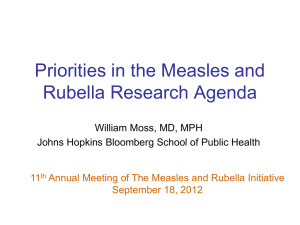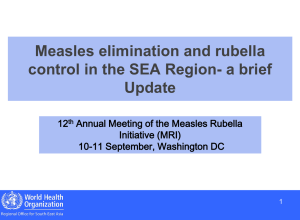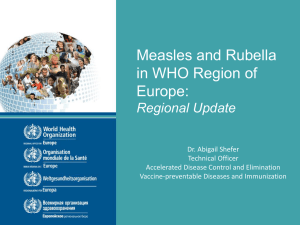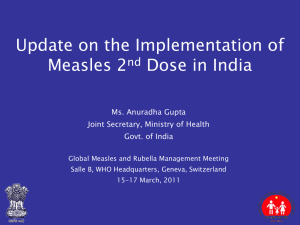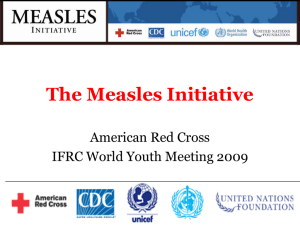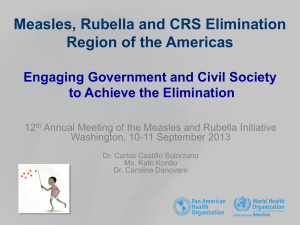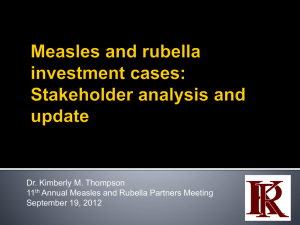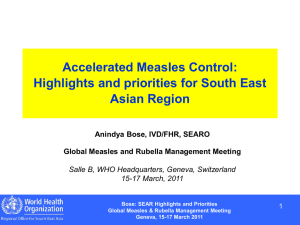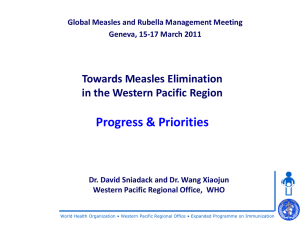EURO - Measles & Rubella Initiative
advertisement
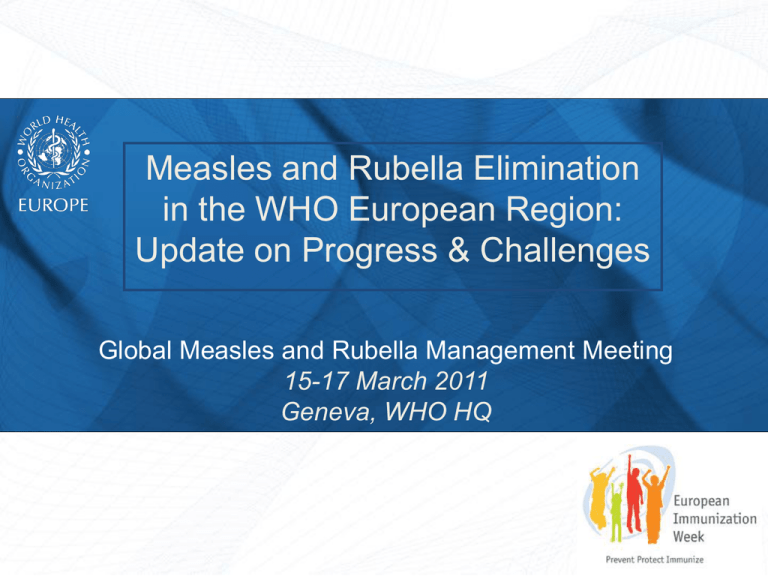
Measles and Rubella Elimination in the WHO European Region: Update on Progress & Challenges Global Measles and Rubella Management Meeting 15-17 March 2011 Geneva, WHO HQ Regional Measles and Rubella Elimination Goals Resolution EUR/RC55/R7 • Original target: 2010 Resolution EUR/RC60/R12 European Region Strategic Plan – New target: 2015 Renewed commitment to MR elimination by 2015 and sustained support for polio-free status Member States: Commit and give goals high priority Ensure required resources Strengthen routine immunization – Focus on pockets with low coverage and mobilize – European Immunization Week Strengthen health system components Strengthen surveillance systems in line with IHR – polio, measles and rubella 3 Renewed commitment to MR elimination by 2015 and sustained support for polio-free status WHO European Regional Office: Provide leadership and strategic direction-Strategic Plan 20112015 Provide technical guidance to Member States Work with Member States on addressing : — vulnerable groups — increasing demand for immunization 4 Progress in implementing Strategic Plan to eliminate measles and rubella in the WHO European Region, 1990-2010* 96% reduction in measles 97% reduction in rubella Catch-up SIAs Measles elimination goal Rubella elimination goal Data Source: 1990-2010: WHO-UNICEF Joint reporting Form ; 2008-2010*: data from Monthly MR surveillance Measles and rubella containing-vaccine coverage: WHO European Region, 2009 Both MCV1 and MCV2 ≥ 95% Either MCV1 or MCV2 > 95% Both MCV1 and MCV2 < 95% Data sources- MCV1: WHO/UNICEF Coverage Estimates; MCV2: WHO/UNICEF JRF Admin Coverage reporting 2009 Reported measles cases WHO European Region, 2004-2010 Continual transmission in western part of the Region Bulgaria 2009-2010 Measles incidence and outbreaks, WHO European Region, 2010-2011* Measles outbreaks in 2010 Measles outbreaks in 2011 *2011: as of February Status of measles and rubella case-based reporting 35 countries reporting case based measles Measles case-based surveillance, 2010 24 countries reporting case based rubella 37 countries state they have case based surveillance for both Data primarily available for confirmed cases Regional Meeting of National Immunization Programme Managers 16-18 November 2010 – Istanbul, Turkey % Completeness and timeliness of reporting from measles and rubella laboratories 2004–2010* WHO EURO target 90 80 70 60 50 40 30 20 10 0 2004 2005 2006 2008 2007 2009 Year % Completeness % Timeliness *Data as of 21 Jan 2011 2010 AND, BIH, ITA, MON, SMR, SWE, MNE not reporting in 2010 Monitoring indicators towards elimination WHO European Region, 2008 - 2010 INDICATOR Target Year Completeness Measles (53) Rubella (53) ≥80% of countries submit complete, expected number of reports 2008 2009 2010* 86.3% 81.6% 74.4% 53.3% 53.6% 48.6% 48.4% 41.9% 28.8% Timeliness Measles (53) Rubella (53) Laboratory confirmation rate Detection rate Chains of transmission/ outbreaks, virus genotyped Source of infection identified Adequacy of investigation ≥80% of countries submit reports promptly for all months (received by WHO by 25th of the following months) specimens adequate for detecting measles IgM should be collected from at least 80% of clinical measles/rubella cases 2 discarded cases should be reported annually per 100,000 population Samples adequate for virus detection should be collected from at least 80% of laboratory-confirmed outbreaks and tested in an accredited laboratory >80% cases with source of infection identified At a minimum 80% of all reported clinical cases should have had an adequate investigation initiated within 48 hours of notification * Jan – Sep 2010 Regional Meeting of National Immunization Programme Managers 16-18 November 2010 – Istanbul, Turkey Monitoring indicators towards elimination WHO European Region: primary efforts ongoing Ensure measles and Rubella case-based surveillance in countries Synchronise WHO EURO and ECDC MR surveillance requirements and develop shared platform by September 2011 Develop alternative documentation strategies as many countries only report confirmed cases Provide countries with guidance on • CRS surveillance • Use of serosurveys Regional Meeting of National Immunization Programme Managers 16-18 November 2010 – Istanbul, Turkey Linkages & collaboration with other programmes Immunization programmes and service delivery strengthened through elimination strategy Integration with maternal and child health programmes at regional and country level towards MDG #4 European Immunization Week – Established to support elimination goals in the Region Linkages with civil society organizations and professional associations (regional and country level) National immunization programmes reviews in 2011 – Focus includes progress towards elimination goal – Bosnia & Herzegovina, Ukraine, Kyrgyzstan 13 Major challenges to achieving the measles and rubella elimination in the European Region • Continued political commitment and transparency by governments Required human and financial resources in face of competing public health priorities and economic situation Increasing momentum of vaccine refusals – General complacency in absence of disease (low risk perception) – Variable public trust in vaccines – Multiple reasons but results are the same -> declining coverage Marginalized and vulnerable groups require tailored approaches to increase uptake of vaccine 14 Hard to Reach ? Marginalised, isolated, excluded, highly mobile? WHO European Regional Office plans, 2011 Political commitment – – – – Regional resolution of Member States (RC60) EU presidency (Hungary and Poland) Regional Director efforts with the inter-government council Measles and rubella strategic plan: 2011-2015 Advocacy – – – – – – European Immunization Week European Technical Advisory Group of Experts on Immunization European Federation of Medical Associations – working group Social media (EURO website; health bloggers) Vaccine safety initiatives European Region Communication Working Group established 16 WHO European Regional Office plans, 2011 Technical – Disseminate elimination framework – Establish regional and national verification commission/committees – Training on regional MR surveillance guidelines – Finalize outbreak guidelines and share best practices among countries Operational research – Develop and pilot toolkit to segment and profile (behavioural determinant models) – Identify alternative service delivery points – New communication strategies with health care workers and susceptible populations – demand creation 17 Measles and rubella elimination verification planned activities, WHO European Region Jan-Dec ‘10 Dec’ 10 Jan-May ‘11 Sep-Oct‘11 Dec‘11 Meeting on feasibility and feed back from internal consult Consultation with country technical experts to finalize framework and address gaps Guidelines finalized First meeting of MRRVC Preliminary feedback to countries Form regional verification commission Meeting with European intergovernmental council Analysis of funding requirements and advocate Work on guidelines and reporting forms Finalize 20112015 Strategic Plan for the Region Form national verification committees WHO European Regional Office proposed budget, 2011 Planned supplementary immunization activities: – Bosnia and Herzegovina - MR catch up – Tajikistan - MR catch up for women of child bearing age – Uzbekistan - MR follow up 1-14 years* WHO UNICEF Operating cost Technical support Surveillance Sub-total Total with PSC Operating cost Bundled vaccines Technical support Sub-total Total with PSC Total 19 * Does not include wider age group for Uzbekistan: 1-14 years $432,000 $0 $440,000 $872,000 $933,040 $144,000 $592,000 $0 $736,000 $787,520 $1,720,560 European Immunization Week Platform for: Improving information on vaccine benefits and safety driving demand for vaccines advocating for political support and financial commitment 2011: ”Shared solutions to common threats” Round table on measles planned in Brussels 2010, 47 countries used advocacy & targeted communication to boost awareness and increase coverage in routine programmes Commitment to the goal Significant progress towards measles and rubella elimination in the European Region of WHO – Drastic decline in diseases reported – Sustained national immunization coverage rates in most countries Strong regional immunization programmes overall due to efforts by Member States and partnerships Established and functional surveillance and laboratory networks Need to reframe activities within the resolution to optimize coverage to meet elimination goal and respond to outbreaks Requires political commitment and shared solutions to common threats Elimination goal is high priority and if appropriate accelerated actions are conducted, the Region will be able to eliminate measles and rubella by 2015 21
